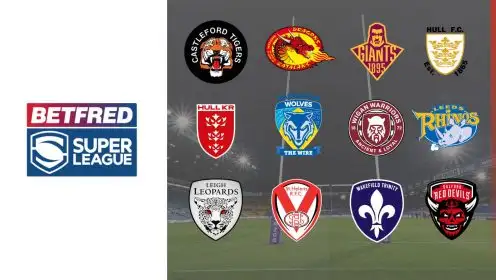What next for Toulouse?

Picture by Paul Currie/SWpix.com
The supposed promised land that Toulouse had been striving to reach for the best part of 20 years has almost come and gone in a flash.
Defeat at Wigan at the weekend, coupled with Wakefield’s win at Hull, means it’s all but mathematically confirmed that Toulouse will be relegated from Super League.
Was it worth it? The exposure Toulouse have had to Super League can only be a positive, while without that carrot, it’s unlikely a promising groundshare partnership at Stade Toulousain would have been forged.
It is not the holy grail that some declare it to be. Rugby league is not just about the 12 teams that are in Super League. It can expand and grow beyond that.
Toulouse must now, presumably, drop back in to the Championship and earn their top flight place back.
DOOMED: Toulouse boss Sylvain Houles all but concedes relegation
French clubs should mean Super League expansion
While I’m certainly not an advocate of scrapping promotion and relegation, perhaps there is an argument to say that if Super League wishes to expand its footprint, it should expand the number of teams in it to suit.
Catalans’ inclusion in the competition remains unique and unrepeated. They were brought in through an application process and afforded three years grace from relegation.
Toulouse, on the other hand, had to do it the hard way. They joined at the bottom in League 1 and worked their way up via the traditional promotion methods to make it to Super League.
Unfortunately for them, that meant no protection from relegation and it is that fate they are now staring in the face.
What really ought to have happened in both cases, is the number of teams in Super League should have been increased to accommodate a strategic expansion.
If there is a genuine belief that having French teams in Super League is commercially beneficial, then it needs to be explored properly.
The theory of two (or more) French teams in Super League is nice – but there is as yet no evidence that it attracts additional broadcast or commercial revenue. Indeed, in its chase of the hypothetical riches of overseas, Super League has diluted the deals it already had.
But the French clubs shouldn’t be blamed for that. Toulouse asked, and were allowed, to join League 1 and work their way up just as any UK club could have done.
The attitude that French clubs are taking “our” money is a disappointing – if that’s the case, don’t invite them in to RFL competitions in the first place.
That’s why it was unfair they had extra sanctions placed on them this season – namely having to pay for the flights of the visiting team. After they had invested in working their way up the leagues, they should have been kept on an even playing field.
Sadly, once again, Super League clubs opted to put the new boys at a disadvantage and for the third successive year, it’s worked.
CALLED IT: Make a pro-active change now Toulouse have reached Super League
Back to the Championship
You have to question the wisdom of Toulouse dropping back down to the (UK) Championship where they will almost certainly be the only full-time team in the competition, assuming favourites Leigh earn promotion.
Toulouse nor the Championship clubs are probably not overly enamoured by the prospect of that situation, particularly in the context of grave uncertainty over the future of central funding.
There has been no suggestion that anything other than the expected will be happening – that is Toulouse returning back to the Championship as per the norm for relegated clubs.
My long-term hope is that the French Championship can raise its standards enough so that it can sit side by side with the RFL equivalent, and act as feeding grounds for Super League in both countries.
The World Cup in France in 2025 might provide the opportunity to do that – though there are some who might hope a full-time French league, that would include Catalans and Toulouse’s first teams, is in the offing.
Developing French players
While in Super League, Toulouse’s match day selections have been made up of 46% French players, which is almost identical to Catalans (47%).
The need to assist full-time player development in France is non more evident than when comparing to their English counterparts though – nearest rivals Wakefield have used 70% UK players, Warrington 86%, Hull KR 75% and Hull FC 70%.
Clearly there has been an increase in French players in Super League in recent seasons, and the ability of Catalans and Toulouse to use the French Elite Championship as a breeding ground for their young players appears to be a sensible, working option with a growing track record.
It would be a shame if all the hard work of recent years is squandered – the question of French and other overseas teams in Super League will no doubt be one up for consideration on IMG’s review of the game.
FOLLOW: Keep up with all the latest via the Love Rugby League mobile app and podcast



